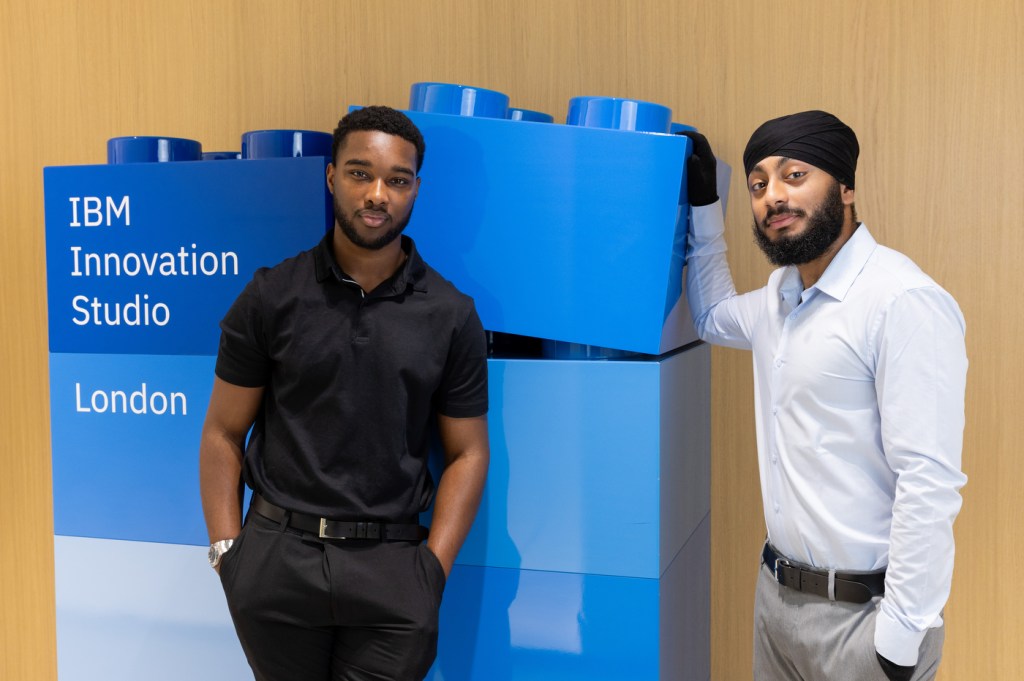IBM workers combine real-world experience with Northeastern studies to make for the perfect career blend
Three London degree apprentices with IBM explain how they combine a full-time tech career while also pursuing a degree in just three years.

LONDON — For Gagandeep Kapoor, business acumen was taught at an early age.
He was only 7 years old when his father used to take him to help out on the family stall selling luggage at the bustling and vibrant Shepherd’s Bush market in West London.
His dad may well have known that having a cute kid interacting with customers was a good ice breaker and a disarming sales technique. But Kapoor says it also gave him an early insight into himself — he found out he was a practical learner.
“From a young age, I knew I really liked learning on the spot,” he says. “For example, if I was to sell something, I wasn’t going to read a 100-page book [about the product]. That might help but I’d prefer to speak to the customer and learn about it.
“So being a bit more practical than theoretical was something that was ingrained in me from a young age. That comes from my dad — he wanted to put me on this path, to teach about the real world from a young age.”
That formative experience also meant the 20-year-old knew that the traditional route in England and Wales of three years of dedicated study for a degree was not for him and that any potential higher education experience had to be “hands-on.”
Kapoor is one of 80 degree apprentices who work for IBM while studying at Northeastern University in London, a number that is expected to grow in October.
As an apprentice, he spends four days a week working for the U.S. technology giant as a technology engineer for clients, ensuring that customers’ front-end experience when using artificial intelligence tools works smoothly. The remaining day of the week is spent studying for a degree in Digital and Technology Solutions at Northeastern, training that is paid for by IBM through its apprenticeship levy.
After three years, he and his cohort will emerge with a degree and a job in which they already have bountiful experience.



Kelly Markwick, U.K. foundation manager at IBM, says the company made a deliberate effort to recruit apprentices directly out of school after realizing that they were missing out on talented people who did not necessarily want the traditional full-time university experience.
“You have essentially got a lot of really talented, bright people out there who find that university and theoretical learning isn’t for them,” she says. “What we realized was that we were missing this huge portion of the population where that way of learning just wasn’t for them.”
What the students are learning on the job will go toward fulfilling their degree requirements, while the studies are designed to support students in furthering their employment, Markwick explains.
“Both things are very closely intertwined,” she continues. “What they learn at university one day a week, they do use that at work. So when they are doing actual work for clients, they will be using elements of what they have learned in their degree — and vice-versa as well.”
Victoria Sinel was another IBM degree apprentice who had a path mapped out for her at a young age — although not in the positive sense that Kapoor had.
At 14, she was asked to choose what non-core GCSEs (the General Certificate of Secondary Education in England, Wales and Northern Ireland that is usually taken when children are 15-16) she wanted to study.
The way her school timetable was set up meant she had to choose between studying dance or technology. It was a tough call. She knew she was interested in tech, having taken part in weekend-long “hackathons” that involve solving problems, but wanted to get the view of her teachers before deciding.
“My dance teacher said, ‘I don’t think you should do computer science because that’s for boys and you would probably do better at dance,’” Sinel recalls.
“She had no idea of my interest in computer science or my capabilities at that time but she still said that comment. So I thought, ‘Fair enough, you think I’d do better at dance so I will do that then.’ I regretted that massively,” she says.
Sinel then spent the next four years having to build her technological experience, including undertaking a qualification in the ethics of AI, in an attempt to reverse that decision and boost her skills.
But she admits to having felt at an impasse when she prepared to leave school. She wanted a career in technology but did not quite have the CV to demonstrate it. She also knew another three years of theoretical learning would not be for her.
“I knew I had reached my capacity for classroom learning,” she says.
Featured Posts
A chance encounter with IBM at a career fair put her on to the idea of applying to the company for a degree apprenticeship. Three years later, she is celebrating a promotion from junior AI consultant to technical consultant at the company and will graduate from Northeastern in the fall with a degree in Digital and Technology Solutions, which includes a specialization in data analytics.
Her job currently sees her contracted out to assist the public sector with software development, a role that has her traveling across the United Kingdom.
Looking back at her experience, Sinel says there were “no downsides” to the career path she took.
“People do appreciate that you are an apprentice and you are learning. But you are doing a real job, you are talking to real clients and so that can be daunting. The job is full time and you also have a degree alongside it, so it can be hard to prioritize. Figuring out that balance was probably the most difficult thing.”
Alpha Bah, 20, is on the same degree course and apprenticeship program as Sinel and Kapoor, completing his studies while also working as a solutions engineer for IBM at its London headquarters.
His role, a blend of both technical and sales skills, suits his personality, Bah says. “The salesperson has to know how to speak to the client and build the relationship,” he says, “while also understanding the tech, how customers are going to use it and why it is going to be of value to them.
“That is where I come in and explain things so they can actually see the benefit. I’ll show them the product in action, doing things like a demo, setting it up for them and then walking them through it.”
There is a certain amount of “discipline” that a degree apprentice needs, Bah argues. He reveals that he “treats work like school,” going over what he has learned in the office during his commute home.
The degree apprentices, in addition to their one day a week of dedicated study time, also have an intensive “bootcamp” week on campus to both fast track some of their learning and help them make connections with peers.
Bah says there is a “feedback loop” between the job and his studies. He explains that learning about databases and the wider technology business environment as part of the degree have sharpened his skillset in the workplace.
“Even though I’m a technical specialist,” he adds, “I still need to understand the business as well and understand how the technology actually affects the business and can drive value. So it is the perfect balance.”










